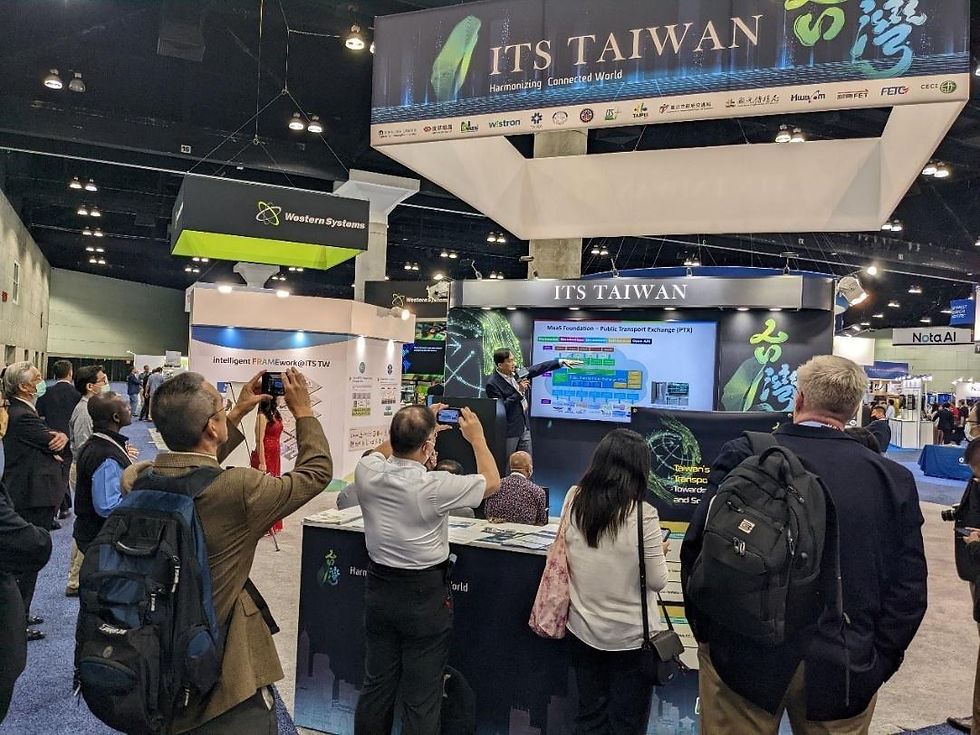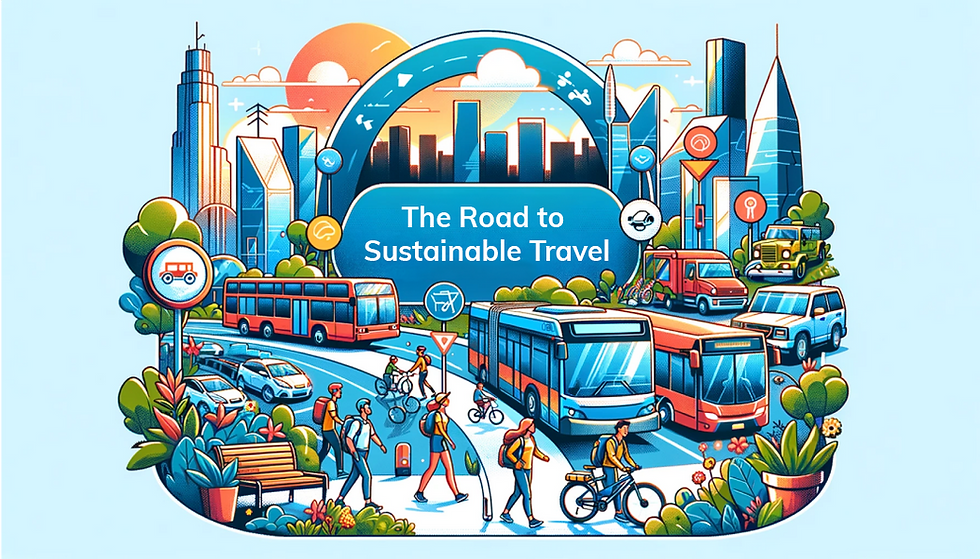Advancing Taiwan's Mobility-as-a-Service (MaaS) API Through Metropia’s Technology
- Mar 4, 2024
- 7 min read
Updated: Oct 18, 2024
From 2019 to 2024, the Metropia team was commissioned by Taiwan’s Ministry of Transportation and Communications (MOTC) to initiate Phase One of Taiwan's national Mobility-as-a-Service (MaaS) API platform. This phase focused on enhancing public transportation and incorporating additional shared mobility options. The Taiwan MaaS API platform offers comprehensive intermodal public transportation travel planning, seamlessly integrating demand-responsive transit services (DRTS), ride-matching mechanisms, and ticketing functions.
The MaaS API service not only brings convenient mobile solutions to enterprises but also strategizes value-added services for users (G2B2C). User travel behavior feedback played a pivotal role in refining the platform to promote a balanced transportation system. Furthermore, collaborative efforts with local governments were undertaken to tailor MaaS API services with distinct local characteristics.
The ultimate objective is to foster the robust development of the MaaS industry, diminish reliance on private vehicles, boost revenue for MaaS operators, and contribute to the creation of a sustainable, low-carbon living environment. The overarching goal is to achieve a carbon-neutral national goal.

1. Visions and Framework for Taiwan MaaS API
Through the concept of MaaS&T (Mobility-as-a-Service & Tool), this project aimed to facilitate the development of Taiwan's MaaS ecosystem by constructing several sets of MaaS API services. These APIs were made freely available for private enterprises to integrate their services, facilitating the launch of MaaS services by these enterprises. The primary characteristics of the Taiwan MaaS API framework include:
Solid foundation data: Integrating Transportation Data Exchange (TDX) public data or private sector-specific data, consolidating into MaaS service information.
Industry focus on data integration and core function development: Taiwan MaaS API integrates basic data with MaaS service function modules and provides them to MaaS operators or local governments in an open API format.
Private sector business model innovation: MaaS operators integrate MaaS API’s and enhance services through innovative business models.
Travel behavior collection and analysis: MaaS operators collect data and analyze user behavior, providing feedback on the MaaS+API core function modules. This feedback is stored in a database and used to refine the core computational functions of the API through artificial intelligence. This positive feedback loop assists MaaS operators in providing users with suitable transportation mobility service content.

Functionally, the Taiwan MaaS API transportation mobility service includes five areas of API capabilities:
1. Intermodal Trip Planning Module:
Integrates Taiwan's major public transportation services, including Taiwan Railways, High-Speed Rail, highway buses, metro, buses, ferries, as well as public and private first/last mile transportation services such as Ubike shared bikes and other transport services.
Users can adjust walking time, transfer time, and the balance between travel cost and travel time to plan a suitable route.
The modular design allows for flexible integration of local first/last mile transport options, enabling local governments to introduce localized transport choices. Example: Taichung City Government integrated 10 major tourism routes with QR code scanning services for tourists, facilitating public transport use and completing travel objectives, including mobile payments.
Unique feature: Highly customizable settings to meet the travel planning needs of different demographics, such as adjusting intermodal transfer times to accommodate slower walking time for seniors.
This module is based on the Metropia Intermodal Trip Planning Technology. More information about this capability can be found in this post.
2. Intercity Ticketing Integration Module:
Allows a MaaS service provider to perform deep-linking cross-app integration with Taiwan High-Speed Rail (THSR) and Taiwan Railways (TRA) official apps, the two major transportation backbones in Taiwan.
The parameters such as origin and destination stations, train schedules, and departure times input to the third-party authorized service can be passed into the THSR and TRA apps to create a seamless user experience for travel planning and ticketing.
Relevant Metropia core technologies can be found on this page.
3. Transportation Service Provider Integration Module:
Aims to establish a streamlined process to facilitate first/last mile local transport network data updates through a defined data format and upload process.
Local first/last mile transportation service provider information could become visible in the intermodal trip planning module, enhancing the exposure and utilization of transport options.
Lowers the barrier for local transport service providers to upload vehicle information, allowing potential users to access information on first and last-mile transport connections.
More information about the underlying technology can be found in this page.
4. Carpool Matching Service Module:
Through an open API, provides the underlying functionality allowing a service provider to offer commuter driver and passenger matching services.
Matches carpool passengers with drivers, reducing vehicle usage and promoting energy savings and carbon reduction.
For enterprises, this module helps reduce carbon emissions, achieve corporate social responsibility goals, and promote ESG sustainable development. For users, this module helps find carpool drivers or passengers, reducing the need for individual car travel.
This module was supported by the Metropia core technology depicted in this page.
5. Demand-Responsive Transit Service (DRTS) Service Module:
Provides foundational API’s to enable convenient and innovative DRTS transportation services and applications.
Small to mid-sized DRTS operators could benefit from this service module without creating the basic pick-up/drop-off, driver-vehicle assignment, and routing capabilities, which are typically technological barriers for these operators to advance their quality of service.

2. Achievements of Taiwan MaaS API Phase One Developments
In the realm of outreach and communication, the focus has been directed towards the innovative utilization of transportation, empowering enterprises to innovate through Taiwan MaaS open API’s. This approach has fostered a robust MaaS ecosystem, expediting the expansion of the pan-transportation industry's scale economy. It has also played a pivotal role in shaping the vision for the overall development of the food, lodging, tourism, and retail industries.
During 2021, various initiatives such as workshops, value chain discussions, and forums were organized to delineate the development of Taiwan's MaaS. Notably, participation in the ITS Annual Conference and Transport Conference in December 2021 served as a platform to promote the five major core open API’s of MaaS API transportation mobility services and their applications, garnering significant feedback from academia and industry.
At the ITS Annual Conference, the Metropia team showcased their accomplishments through an exhibition. In March 2022, they actively participated in the Smart City Expo in Taipei, elucidating Taiwan's advanced practices in the MaaS field to both domestic and international guests. Furthermore, two tourism-focused workshops were organized, focusing on "How MaaS can Boost the Tourism Industry Post-Pandemic." These workshops, tailored for upstream and downstream cooperation in the tourism industry, facilitated brainstorming and discussions on new MaaS tourism business models in Taiwan.
In 2022, Metropia team engaged in the ITS World Congress 2022 at the Los Angeles Convention Center. Here, they showcased the "Taiwan MaaS Open API For Emerging Mobility Services" and highlighted the achievements of Taiwan's MaaS open API project. On September 21, Dr. Yi-Chang Chiu, the project leader, delivered a speech on "Why MaaS is set to Takeoff in Taiwan" and exchanged valuable insights with the attending guests.
Efforts were dedicated to promoting Taiwan's MaaS open API at the ITS World Congress. In October, an online course on Taiwan's MaaS open API was organized, attracting over a hundred participants from industry, government, and academia.


From January 1, 2023 to February 5, 2024 the API usage surpassed three million API calls made by third-party MaaS service providers, as illustrated in the figure below. A total of 17 enterprises have signed an MOU, preparing for further utilization of the Taiwan MaaS API platform. These companies represent four categories of industries- municipal governments, the tourism industry, MaaS operators, and transportation-related sectors.


3. Taiwan MaaS API Phase Two Objectives
The multi-year Phase Two extension, commencing in January 2024, aims to ensure the stable service of the five core modules' Open API, optimize functional service modules and system environmental resources, improve information security, and ensure service quality meets user needs. Additionally, by connecting with another MOTC’s TDX platform, the project aims to provide more timely, accurate, and robust transit service information updates. Taiwan MaaS API will further incorporate data on domestic flights, inter-island maritime services, and the Alishan forest railway, expanding transportation services to include maritime and air transport.
Optimization of MaaS API Functional Service Modules
Reference the Ministry of Transportation's TDX value-added service GTFS for bus/rail content and basic service API information such as operators, routes, schedules, and stations for each vehicle.
Internally aggregate and convert this information into public transport networks.
Deploy the aggregated data to the core modules for real-time and consistent data across the MaaS API platform.
Add standards for Demand-Responsive Transportation Systems (DRTS), shared vehicles, and rental cars.
Enhance real-time information for domestic aviation, inter-island transportation boats, and the Alishan forest railway.
Integrate this information into the MaaS Open API standard format and specifications.
Expand the range of services offered by MaaS API, including maritime and air transport.
Strengthen shared and rental car services.
Counseling Local Governments and Value-Added Units to Integrate Services
To promote the API integration capabilities of local governments and industries for the five major functional modules, we provide systematic education and training to familiarize participants with MaaS-related integration technologies, standards, and cases. This reduces entry barriers and speeds up integration. The areas of focus include:
Providing Technical Support: the project team will offer rich documentation, tutorials, and example code to assist local governments or businesses in developing and integrating MaaS service API’s easily.
Application Examples: the project team will provide application examples to help local governments and industries understand their application scenarios more quickly.
Developer LINE Group Service: the project team will set up a developer instant messaging group in services like LINE to assist with integration issues when they arise.
In alignment with the ongoing efforts to promote the Mobility-as-a-Service (MaaS) concept initiated during Phase 1, this project extension not only marks the success of the Phase 1 deployment but also underscores the unwavering commitment of the Ministry of Transportation and Communications (MOTC) to propel the creation and expansion of the MaaS industry in Taiwan.
While the global reception and outcome of MaaS deployments have been diverse, Taiwan stands out for adopting an innovative and distinctive approach to harness the potential of MaaS, aligning it with the country's economic and sustainability objectives. This strategic move positions Taiwan at the forefront of the global transportation development trend.
In Taiwan's upcoming four-year Intelligent Transportation Systems (ITS) program, encapsulated by the guiding principles of "Go Safe, Go Smart, and Go Green," MaaS remains one of the cornerstones in the overall program development. Metropia takes pride in its ongoing role as the trusted technology solution provider for MOTC, supporting its visionary and progressive approach to national transportation initiatives.
For more information about the API platform, please visit www.umaji.com.tw (in Traditional Chinese Language only).


